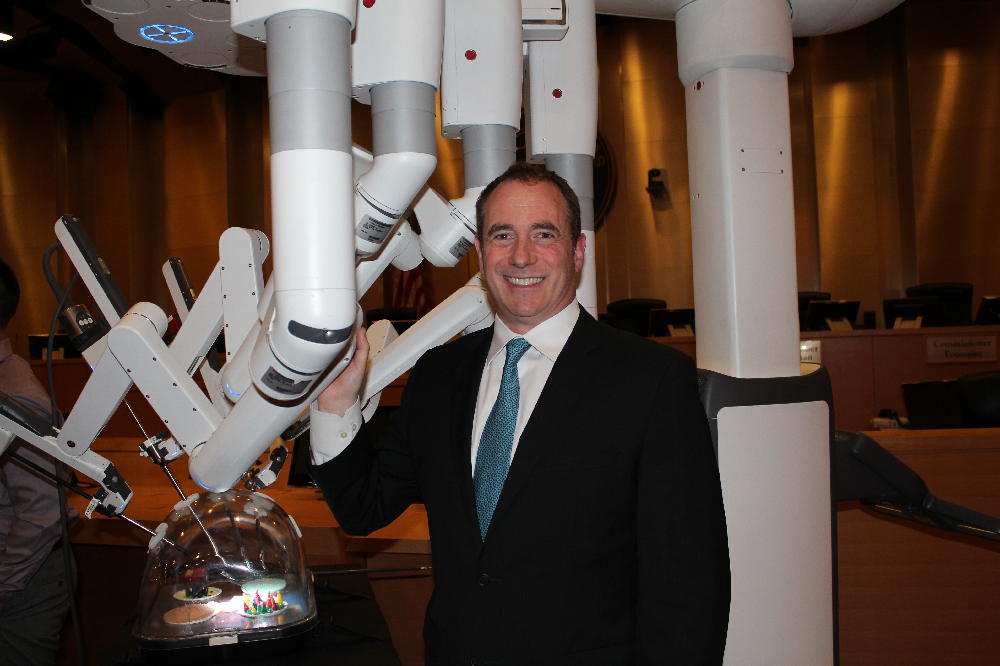- Home
- About
- Benefits & Services
- State Veterans Homes
- Nevada Veterans Memorial Cemeteries
- Community
- News
- Suicide Prevention
- Opioid Prevention
- Donate
- Fallen Heroes
- Nevada’s Veterans Memorials
- Calendar/Events
- Nevada Transition Assistance Program (NVTAP)

By Chuck N. Baker
The word “robot” may conjure up visions of science fiction books and movies involving metallic creatures who can range from being cute to downright scary. But today, robots are no longer simply works of science fiction. They are very real and in the medical community, robots are becoming a very useful tool, especially when it comes to robotic surgery.
The Department of Veterans Affairs is fully embracing robotic surgery as an important tool when treating veterans. During a recent presentation at the Southern Nevada Healthcare System, VA Chief of Staff Dr. Ramu Komanduri noted there are currently two staff physicians who specialize in robotic surgery: Dr. Kevin Dunn and Dr. Jaclyn Munn. He said recently the North Las Vegas facility hired a third physician with a robotic specialty, Dr. Frances Allocco. Komanduri explained the benefits of robotic surgery, including smaller incisions and quicker recoveries.
At a recent event held in the chambers of the Las Vegas City Council, civilian doctors who practice at medical facilities within one of the city’s two local medical districts presented success stories that include regular use of robotic surgery. The program included representatives from Valley Hospital Medical Center, the Clark County Medical Society, the Cleveland Clinic Lou Ruvo Center for Brain Health, Steinberg Diagnostic Medical Imaging and UMC.
Actual cases were discussed and successful patient treatments were explained. One patient, Christine Marshall, underwent a double mastectomy to prevent a future recurrence of breast cancer. While another patient, Karen Freed, was diagnosed with early stage Alzheimer’s. She is successfully participating in a clinical trial at the Lou Ruvo Center for Brain Health.
Dr. Leslie K. Browder, board certified as a colorectal surgeon and general surgeon, explained that robotic surgery is generally minimally invasive. She stood next to robotic equipment that was brought in for the public to view. Known as DaVinci Machines, she said that Las Vegas has 29 of these systems in operation as well as many teams of doctors who use them. When asked about sharing robotic surgical information with the VA, she said that such details are often sent to VA offices.
Robotic surgery is but one of several areas of VA treatment. Komanduri explained the VA makes a tremendous effort to provide information about VA services, which he said included, “multiple methods of treatment.” He also noted there are some limitations concerning local treatments. “We don’t have a lot of [medical] services in Nevada,” he said. Specifically, he noted that patients who require heart transplants, liver transplants or lung transplants must go out of state for such services. He also noted, “It’s very, very difficult to recruit specialists” in the State.
Las Vegas Mayor Pro Tem Lois Tarkanian told those at the City Hall event, “We have very fine doctors here. But I know we don’t have enough.” On a related note Komanduri pointed out the VA is experimenting with what he called “novel things” when treating patients. He cited such communication efforts as video connections, smart phones, chat rooms and self-directed help.
The local VA recently became a partner with the VA Midwest Health Care Network’s Regional Tele-ICU System, based in Minneapolis. The initiative provides local medical staff with around-the-clock bedside access to experts who are specially trained in the care of critically ill patients. Komanduri also said that efforts are being made to assist the medical staff to be more aware of PTSD, and specialized training along those lines is now mandatory. He said that treatment for “mental health [is] a priority” with the VA. “We’re here for veterans and we need to do the right thing.”
On a strong positive note, Komanduri said as the overall VA budget is increased, more staff members are being added. Local VA Director Peggy Kearns said that new buildings are being designed for the property that will specialize in primary care and that will also include a woman’s clinic.